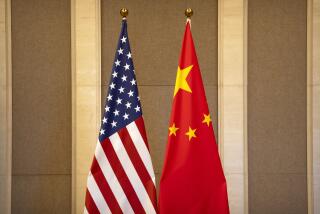America’s Got an Image Problem, Panel Warns
- Share via
WASHINGTON — The United States is losing badly in the court of world opinion and needs to revolutionize the way it communicates its policies and ideas if it is to counter anti-Americanism and terrorism, says a report released Tuesday by the Council on Foreign Relations.
“There is little doubt that stereotypes of the United States as arrogant, self-indulgent, hypocritical, inattentive, and unwilling or unable to engage in cross-cultural dialogue are pervasive and deeply rooted,” concluded a high-powered panel of 35 business and media leaders, scholars and former diplomats assembled by the nonprofit foreign policy study group.
The White House, which was briefed seven weeks earlier on the contents, greeted the report with the announcement of a new Office of Global Communications aimed at improving America’s image abroad.
President Bush believes “that America is such a force for good around the world, yet we hear messages from other nations that they don’t see what the American people see in our country,” White House Press Secretary Ari Fleischer said.
The new office will be formed in the White House but will work with the State Department’s Office of Public Diplomacy, officials said.
Its focus will go beyond the Middle East and Europe, where U.S. policies on Israel and a perceived unilateral approach on foreign policy have made America deeply unpopular, even among nations considered the staunchest U.S. allies.
Drawing on the model of the 24-hour communications “war room” the United States used to brief world media during the military campaign in Afghanistan, the new office will try to do a better job of listening to public opinion in Asia, Latin America, Africa and elsewhere and explaining U.S. policies, officials said.
The debate now developing in Washington is over whether the U.S. can improve its image by being a better listener and communicator, or whether America’s policies and its position as the world’s sole superpower guarantee that it will remain unpopular no matter how well it sells itself.
The report by the council’s Independent Task Force on Public Diplomacy argues that “image problems” and foreign policy cannot be separated during a war against terrorism.
“We cannot always make others happy with our policy choices, nor should we,” the report says. “Part of our challenge is to better explain why we do what we do, and then to accept that many will differ. We may be able to offset some of the hostility, but not eradicate it. This is part of being a great power. We should not leave the impression that all differences are resolvable, or could be if we would just be nicer or more empathetic.”
After Sept. 11, former senior Bush advisor Karen Hughes spearheaded the creation of the Coalition Information Centers, 24-hour press operations in Washington, London and Islamabad, the Pakistani capital, staffed by veterans of American political campaigns.
Officials are eager to make that assertive posture a permanent part of U.S. diplomacy. Sources said Tucker Eskew, a former Bush campaign aide who worked in the Coalition Information Centers, was the leading candidate to head the new Office of Global Communications.
One of the goals of the new office is to overhaul State Department policies that require officials in far-flung embassies to clear speeches and statements with Washington in advance. The process can take days.
The American political establishment is well aware that “any criticism that goes unanswered is considered true,” said Sam Stratman, spokesman for Rep. Henry J. Hyde (R-Ill.).
The House has already approved a bill by Hyde and Rep. Tom Lantos (D-San Mateo) to spend an additional $255 million over two years to reform the State Department’s public diplomacy efforts, start satellite TV broadcasting to the Middle East and beef up foreign exchange programs.
“The poisonous image of the U.S. that is deliberately propagated around the world is more than a mere irritation,” Hyde said in a statement. “It has a direct and negative impact on American interests.”
The task force report outlines the dimensions of America’s public relations problem, citing polls in the Middle East showing widespread opposition to the war in Afghanistan, positive views of Osama bin Laden and doubt that Arabs carried out the Sept. 11 attacks.
The U.S. spends just $5 million a year on global public opinion research--compared with the $10 million spent on polling by the political campaign of New York Mayor Michael R. Bloomberg, said task force member David E. Morey, founder of DMG Inc., a corporate strategy group. U.S. corporations spend $6 billion a year in overseas research and $222 billion on foreign advertising, whereas the entire U.S. budget for public diplomacy is $1 billion, he said.
In Saudi Arabia, 50% of the population is under age 20, Morey said. That’s the target group for terrorist recruiting, but those Saudi youth exposed to the Internet and global satellite TV are more favorably inclined toward the U.S., he said.
“If we don’t understand that young Muslim mind, we are betraying a strategic interest of the U.S.,” Morey said.
Yet some task force members dissented from the notion that image-making should be given equal priority with policymaking.
“Equating America’s standing with popularity, however obliquely, makes me flinch,” wrote China expert Bette Bao Lord.
The consensus report recommends reforms that include making sure that U.S. policymakers anticipate likely foreign reaction to their moves; spotlighting the core American values that have resonance elsewhere; and enlisting as messengers credible private citizens, including Arab Americans, Muslim victims of the Sept. 11 attacks, and Muslim and Arab business and scientific leaders, sports figures and celebrities.
“If we can get Muhammad Ali, we should,” said Peter G. Peterson, chairman of investment firm Blackstone Group.
More to Read
Sign up for Essential California
The most important California stories and recommendations in your inbox every morning.
You may occasionally receive promotional content from the Los Angeles Times.










